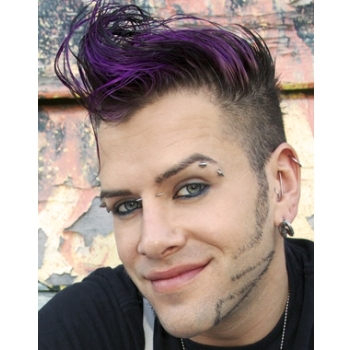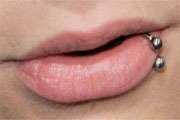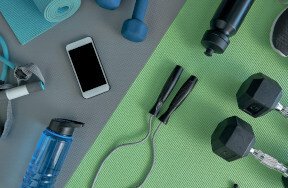Are you thinking of getting your ears pierced? What about other parts of your body? If you're considering it, here's the lowdown on what you need to know to make an informed decision.
How is body piercing done?
A professional inserts a hollow needle through the body part getting pierced. Then a piece of jewelry is placed into the hole.
What can you get pierced?
Earlobes, nostrils and bellybuttons are pierced most often. You could also get your eyebrow, cheek, lip, tongue or other fleshy body parts pierced.
What do you put in a piercing?
The standard earrings are hoops, drops, dangles and studs. Huggy earrings, threaders, ear spikes, barbells, circular barbells, flesh tunnels and plugs are also used, though not as frequently.
Is there anyone who shouldn’t get a piercing?
If you are under 18, some places won’t let you get a piercing without a parent’s consent. If you have a [kwlink 5278]heart condition[/kwlink], diabetes, blood disorder, or other medical condition you may have a higher risk for a serious infection after a piercing, so talk with your doctor to get all of the information about risks before you decide to pierce. If you plan to get your tongue or mouth pierced, get a dental checkup and cleaning first to be sure your teeth and gums are healthy.
If you are allergic to some types of metals, make sure the jewelry you use is made with non-toxic materials like surgical steel, gold, titanium or platinum.
Where should you get it done?
In some places, body piercing must follow strict health and safety guidelines. In other places, you’re not guaranteed a safe environment. Never do it yourself or have a friend pierce you. The shop where you get pierced must:
- Have sterilizing machine
- Be a clean environment
- Require the person doing the piercing to wear fresh disposable gloves
- Safely throw away used needles and use a clean needle each time
Normal reactions
A normal reaction to a piercing is minor pain and swelling and a little redness. If you get your tongue pierced, you may have to deal with some excessive saliva for a while, and it will take a few days to adjust to eating and talking.
How to care for a piercing
When you pierce any part of your body, you are basically creating a wound. You must properly care for the area and help it heal, keeping it clean, allowing for good air circulation and avoiding bacteria until it heals completely.
Always wash your hands before and after touching the piercing site. Clean the site with soap and water, not alcohol or peroxide, twice a day. Don’t pick at the crust that forms around the piercing site; the crust will come off with soap and water. For a mouth piercing, rinse your mouth with alcohol-free mouthwash after eating to keep the site free of bacteria, and avoid kissing while the piercing is healing. If you have really bad breath after a mouth piercing, you may be washing away too much necessary bacteria, in which case rinse your mouth with warm salt water after eating and stick to mouthwash only twice a day. For a face piercing, keep the area free of makeup or powder while it is healing. For body piercings, wearing loose clothing around the area will help it to heal faster and avoid irritation. For nostril piercings, clean the area inside the nostril with a saline spray.
What could go wrong?
If you get your piercing done by a safe, careful person in a clean environment, piercings almost always go well. In some cases, however, you could end up with a minor or major infection, uncontrollable bleeding, scarring, tetanus, skin infections, or pus-filled sacs at the piercing site. If you have increased pain, redness, swelling, an unusual pus-like discharge or see other signs of infection, do not remove the jewelry. See a doctor for immediate treatment to avoid more serious problems.
In some cases, you may be sensitive to the cleaning products you use. The area may become dry, cracked, scaly, irritated, itchy or feel like it’s burning. Change to a more mild cleaning product, use less soap, or rinse more carefully with water.
You may not know that you have a sensitivity to certain types of jewelry. It’s always best to use pure metals like gold, surgical steel or titanium to avoid reactions. If your piercing is itchy, red, irritated or develops a rash, and your jewelry is not made of one of these substances, try switching your jewelry and see if it improves.
For mouth piercings, having metal jewelry in your mouth could cause your gums to get irritated, cause future gum problems and disease, erode your teeth and cause them to chip or crack. Mouth jewelry that becomes unfastened can cause a choking hazard. Since your mouth is constantly filled with bacteria, there is a much higher risk of infection with mouth and lip piercings.
When wearing hoops, hooks, threaders, flesh tunnels or other dangling jewelry, the jewelry can get caught or pulled and the flesh will tear. This requires immediate medical attention and will often require stitches and may cause permanent scarring or other damage.
Have Your Say
Do you think body piercing is only for celebs, or is it cool for teens, too? What’s the most “interesting” place you’d get a piercing?
Related Stories
- Is My Body Piercing Safe
- Dear Dish-It: I’m Desperate for a Lip Piercing
- Shiloh Bio
- More Style Stories




































